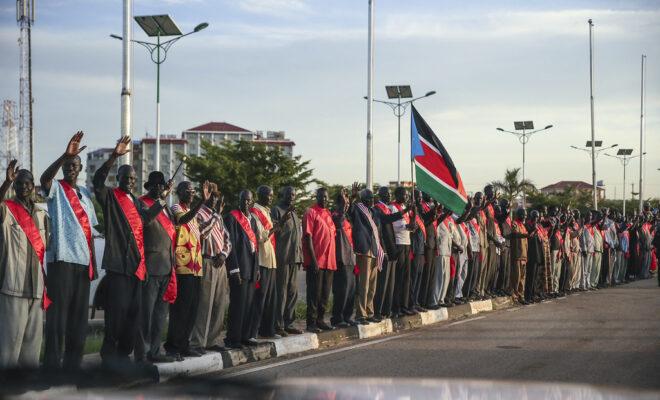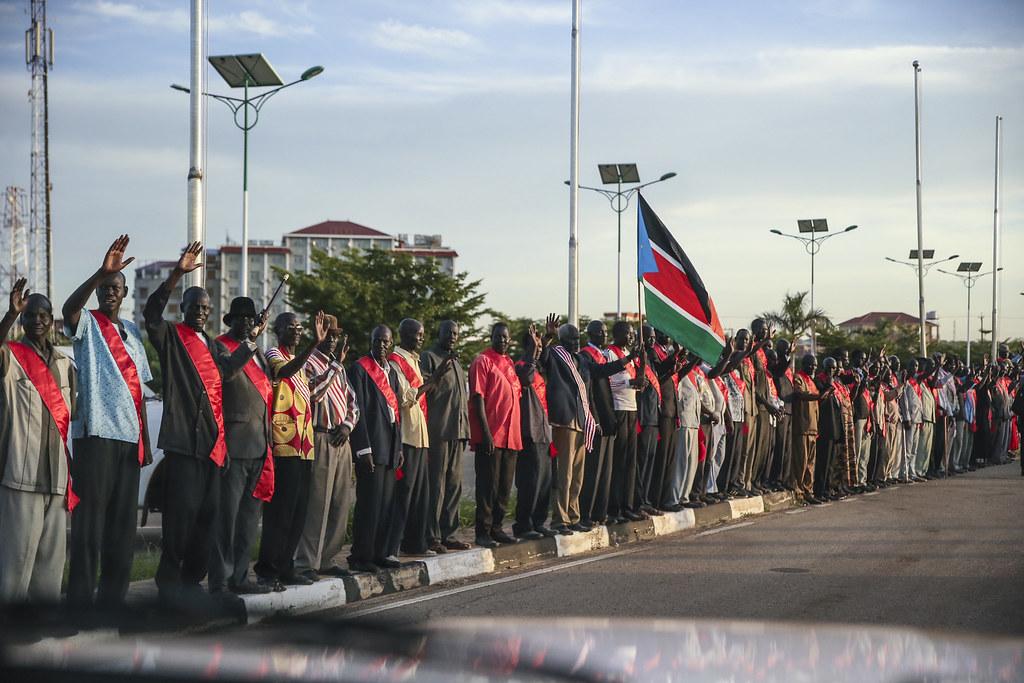10, 21, 28, 32, ?: Why South Sudan’s peace might rest on a number

South Sudan has until 22 February to form a coalition government. One particular quarrel has proven intractable, until recently.

South Sudan had ten states at independence. It now has 32 states. Credit: UNMISS
The 22 February 2020 deadline to form a unity government is fast-approaching in South Sudan. This date has already been delayed twice and, with just days to spare, important disagreements between President Salva Kiir and his former vice-president Riek Machar are still unresolved.
After seven years of civil war between the Kiir-led state forces and the Machar-led Sudan People’s Liberation Movement-In-Opposition (SPLM-IO), there are many outstanding tensions that make the formation of a coalition government difficult. The different parties have serious security concerns and distrust is high, but arguably the key stumbling block at present is far more procedural and technical: the number of states in South Sudan.
Why does this issue matter so much for Kiir and Machar? Why has it been so difficult to move past? And will a recent concession by President Kiir pave the way for rebel leader Machar to finally rejoin the government?
Why is the the number of states important?
When South Sudan gained independence in 2011, it was divided into ten administrative states. From early on, however, many groups across the country called for greater federalisation.
In 2014, a year into the civil war, the SPLM-IO read this political mood correctly in calling for there to be 21 states. In October 2015, President Kiir wrested back this political initiative by issuing an executive order dividing the country into 28 states, which was later expanded to 32 states. Although the principle of decentralising was widely agreed, Kiir’s unilateral decision clearly violated the August 2015 peace agreement signed just two months previously.
Despite this, Machar submitted to international pressure and reluctantly rejoined the government in April 2016 as vice-president. Just three months later, however, Machar fled the capital Juba following a shootout between his and Kiir’s bodyguards.
War resumed before the parties signed another power-sharing peace agreement in September 2018. Machar agreed to join a coalition government, but only on the condition that South Sudan reverted to ten states or was modified to his proposal of 21 states.
What has the change to 32 states meant?
As well as breaching the peace agreement and delaying a resolution of the war, the division of South Sudan into 32 has had several repercussions. One is that it has created political contests over the location, ownership and control of the new states’ administrative centres. The locus of power within the states has crucial importance to competing groups and disagreements have already triggered violent inter-communal conflicts.
The inflation of the number of states has also led to a bloated payroll, increasing government expenditures in a country facing severe economic stress. The local economies of the headquarters of the original ten states have also suffered immediate losses.
Has President Kiir now changed his position?
The disagreement over the number of states proved intractable for years with both sides digging into their fixed positions. This seemed set to scupper the deadline to form a unity government, but on 14 February President Kiir made the surprise announcement that he would accept South Sudan returning to ten states and began removing the 32 governors.
Part of his proposal, however, was that additional three areas would also be awarded the status of administrative areas: Abyei, Ruweng and Pibor.
Has the opposition accepted the compromise?
The opposition has welcomed Kiir’s compromise but reject the idea of giving individual status to additional areas. In particular, they object to the special treatment of Ruweng and see it as a way for the president to reward the Ruweng Dinka – who have long felt marginalised in Unity state – for their support during the war. The strength of Machar’s opposition could be interpreted as a result of his own intentions to consolidate power particularly in areas such as Unity state, which is dominated by the Nuer people.
Nonetheless, it seems the SPLM-IO will accept joining a coalition government in time for the deadline, but continue to oppose the idea of giving special status to the three areas from within. This already seems like it will be an uphill battle for them. Although the SPLM-IO is the main opposition, there are several other groups who will also participate in the government, diluting its influence.
What does this mean for the peace process?
The disagreement over Ruweng has reignited the simplistic narrative that South Sudan’s civil war is of Dinka vs. Nuer, based on the fact that Kiir is Dinka and Machar is Nuer. Whether or not there is some truth to this, quarrels based on identity can quickly become intractable.
This means that while there has been some movement on the issue of South Sudan’s number of states, the matter is still far from being resolved. And if the two leaders fail to come to a compromise suitable for both of them – and the regional body IGAD fails to impose a solution – by the 22 February deadline, the peace process could yet unravel.
In South Sudan, both parties think of power and resources in terms of a zero-sum game. This thinking has clearly informed their approach to the disagreement over the number of states. But even if a unity government were formed, it would still inform their approach to governance, turning their years of bitterness and distrust into a powder keg of tensions.
As regional and international partners pressure Kiir and Machar to find a way to meet the upcoming deadline, they must also think how decisions today will play out once the rivals are back in the same government. Meeting the 22 February deadline is just the next step in a long and difficult journey.





